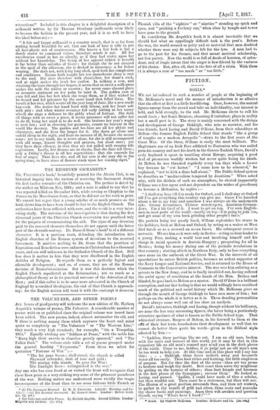THE VOLUNTEER, AND OTHER POEMS.t
Au. lovers of good poetry will welcome the new edition of Mr. Herbert Asquith's volume of poems, The Volunteer. A considerable number of poems writt en or published since the original volume was issued have been added. The new poems, indeed, almost outnumber the old, and if there is nothing among them which captures the heart and mind quite so completely as " The Volunteer " or " The Western Lino," they reach a very high standard ; for example, " On a Troopship, 1915." Equally striking are "Soldiers at Peace," with the noble line
Hang high their swords in churches greatly spanned," and " The Fallen Poet." The volume ends with a set of poems grouped under the general heading " Fragments." From these we select for quotation " Fortune of War " :- " The far guns boom : shell-struck the church is rolled Skyward athunder, dust of rose and gold : The staring villa stands. So goes the War : The limelight lives : extinguished is the star."
Any one who has ever lived at or visited the front will recognize that these lines paint in a very striking way some of the grimmest paradoxes of the war. Nothing makes one understand more vividly the tragic inconsequence of the front than to see some hideous little French or
• (1) The Sacrament Reeerved. By W. IL Freestone. London 1KOwbray and Co- t2Cs.]---(2) The &served Sacrament. By Darwell Stone. London: Robert Scott. 12s. Od. net.] t The Volunteer, and other Poems. By Herbert Asquith. Second Edition. London • IlIdgwIck and Jackson. [Is. net.'
Flemish villa of the " eighties " or " nineties " standing up spick and span, and " pricking a Cockney ear," when close by temple and tower have gone to the ground.
In considering Mr. Asquith's book it is almost inevitable that we should feel what an appallingly difficult task is the poet's. Before the war, the world seemed so petty and so material that men doubted whether there were any fit subjects left for the lyre. A man had to go to the past for his themes, and that meant metrical scholarship, not live poetry. Now the world is so full of deeds of heroism, of splen- dour, and of tragic intent that the singer is bew ildered by the vastness of his choice. But, after all, that is the fate of all a rtists. With them i t is always a case of " too much " or " too little."


























 Previous page
Previous page